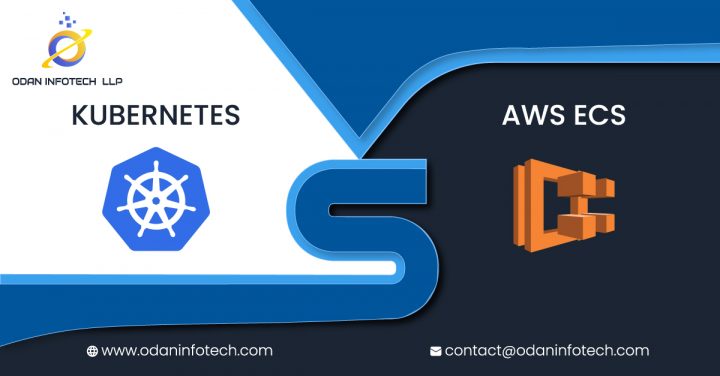Container use is growing fast across a wide range of design use cases, but it is not a simple plug-and-play solution. Adopting containers becomes quite challenging, especially when it comes to executing them at scale because most businesses have very limited resources.
Top businesses choose K8s because they believe they will help break down container adoption barriers. Kubernetes is the first step in creating scalable contemporary apps, according to several leading businesses. As per the research, 83% of enterprises use Kubernetes as their container orchestration solution, compared to 24% who use ECS, according to a study.
Spotify has seen considerable cost savings thanks to Kubernetes, as this case study shows. The orchestration capabilities of K8s have resulted in 2-3x higher CPU usage, which has improved expenditure optimization.
The Google-developed and Cloud-hosted Kubernetes container orchestration solution also makes use of Docker to run. The fact that Kubernetes has a significant community deserves attention.
On the other side, scaling up apps is made possible via Amazon ECS, a container orchestration platform. As demand grows, it continuously adds more containers to run the application operations.
Both technologies have good and bad points when used, making it crucial to study them before selecting one based on your company's needs.
What Is Kubernetes?
Kubernetes is an open-source platform for container orchestration, a container workload management system that was created by Google, and is widely used by businesses. One of the main advantages of Kubernetes is its ability to automate rollbacks for containerized apps, as well as cluster self-healing, secrets, and configuration management.
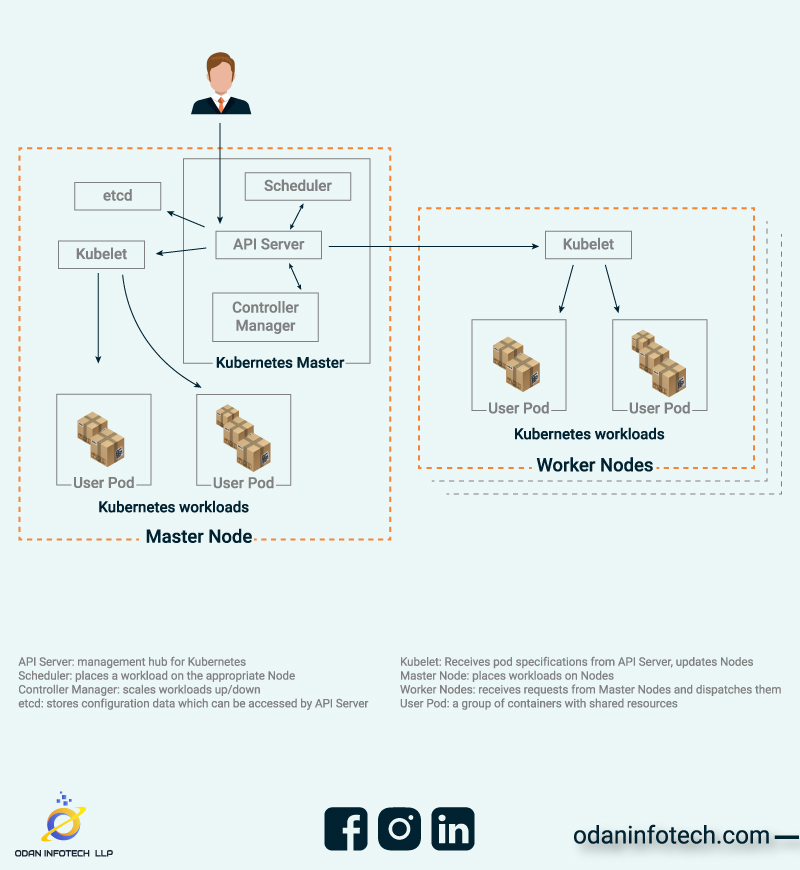
The above diagram describes, that there are several components associated with a Kubernetes cluster. The master node places container workloads in user pods on worker nodes or itself. The other components include:
- etcd: Using a simple HTTP or JSON API, the Kubernetes master's API Server may retrieve the configuration data that is stored in this component.
- API Server: The Kubernetes master node's management hub is defined by this component. It makes communication between the various parts faster, ensuring the cluster's health.
- Controller Manager: By scaling workloads up and down, this component makes ensuring that the clusters' desired state matches their existing state.
- Scheduler: The task is assigned to the proper node by the scheduler.
- Kubelet: The API Server sends these component pod specifications, and it manages the pods that are currently running on the host.
Further, Kubernetes-related terms are included in the list below:
- Pods: Containers are deployed and scheduled by Kubernetes in groupings known as pods. A pod is a collection of containers that operate on a single node and share IP addresses, filesystems, and kernel namespaces.
- Deployments: You can design and control a collection of pods using these building elements. To scale horizontally or to guarantee availability, deployments can be utilized with a service tier.
- Services: Kubernetes will automatically round-robin requests to and from services. These are endpoints that can be addressed by name and can be connected to pods using label selectors. Services are the "external face" of your container workloads in Kubernetes.
- Labels: These are object-attached key-value pairs. They may be used to update and search a collection of related things.
What Is ECS (Amazon Elastic Container Service)?
A container orchestration service called Amazon Elastic Container Service (ECS) is used to scale, deploy, and manage containerized applications. Through API calls and task definitions, ECS enables developers to install and manage scalable applications that are operating on a collection of machines known as Clusters.
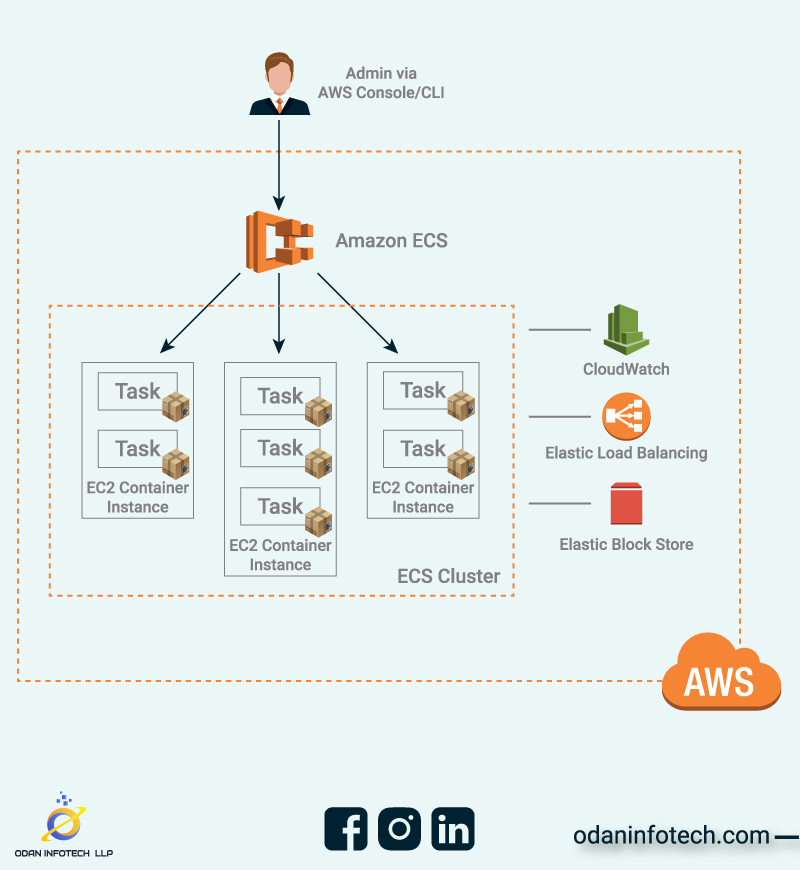
As per the above diagram described, the tasks that run in Docker containers and container instances are just two of the many components that make up an ECS cluster. Some AWS services that frequently work with ECS are listed below:
- Elastic Load Balancer: Traffic may be directed to containers via this component. There are two types of load balancing: application and classic.
- Elastic Block Store: For ECS tasks, this service offers persistent block storage (workloads running in containers).
- CloudWatch: Metrics from ECS are gathered by this service. Scaling up or down ECS services is possible based on CloudWatch measurements.
- Virtual Private Cloud: Within a VPC, an ECS cluster functions. There may be one or more subnets in a VPC.
- CloudTrail: ECS API calls can be recorded by this service. The type of request made to Amazon ECS, the originating IP address, the user's information, and other facts are collected
- State Engine:: The state engine is made to keep track of running containers, available hosts, and other cluster managers' duties. Many EC2 container instances and containers may be found in a container environment. It is vital to monitor the availability of instances to fulfill new requests depending on CPU, memory, load balancing, etc.
- State Engine: To deploy containers in the best EC2 container instances, these components leverage data from the state engine. For jobs that run for a brief period of time, the batch job scheduler is employed. Long-running applications take advantage of the service scheduler. It has the ability to automatically add new tasks to an ELB.
- Cluster: An AWS region's logical placement border for a group of EC2 container instances is represented by this. A cluster may scale up and down dynamically and span several availability zones (AZs). There may be two clusters in a dev/test environment: one for production and one for testing.
- Tasks: Work is divided up into tasks. Container locations are specified in task specifications that are expressed in JSON (on an EC2 container instance). Despite the fact that jobs typically only comprise one container, they occasionally do.
- Services: The number of tasks that should be active simultaneously throughout a cluster is specified by this component. The service scheduler may be used to put tasks and you can communicate with services via their API.
ECS - an Amazon service, is made up of multiple integrated parts that let administrators build tasks, services, and clusters:
Due to vendor lock-in, it should be noted that ECS exclusively controls ECS container workloads. Running containers on infrastructure other than EC2 is not supported, including physical hardware and alternative clouds like Google Cloud Platform and Microsoft Azure. Of course, the benefit is having access to all of the other AWS services, like Elastic Load Balancers, CloudTrail, CloudWatch, etc.
Key Differences! - Kubernetes And Amazon ECS
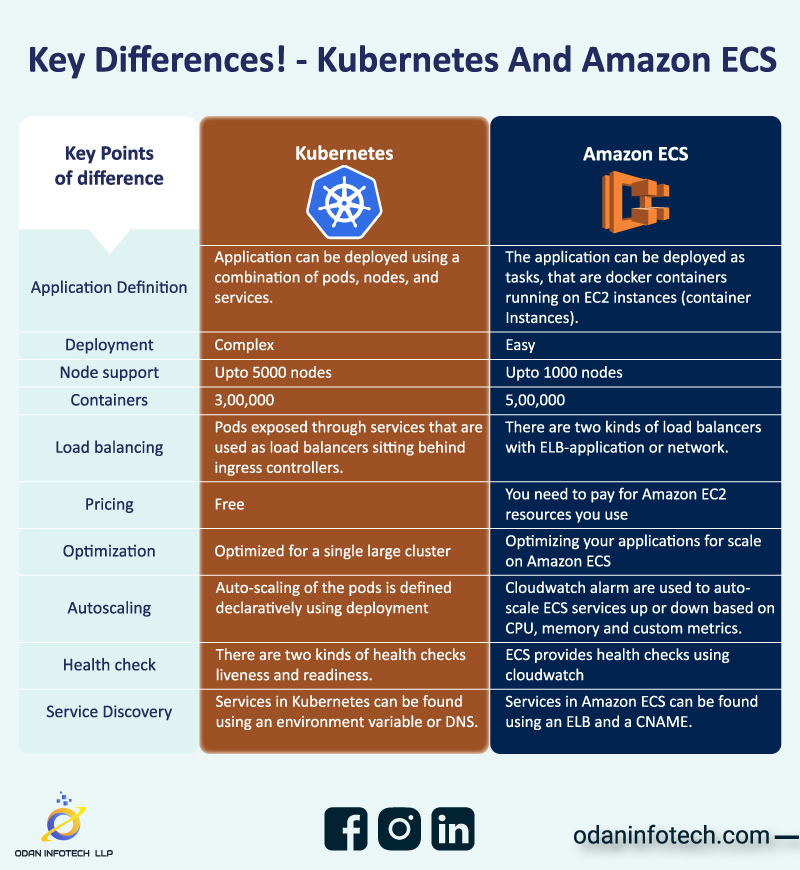
Kubernetes: Advantages And Disadvantages
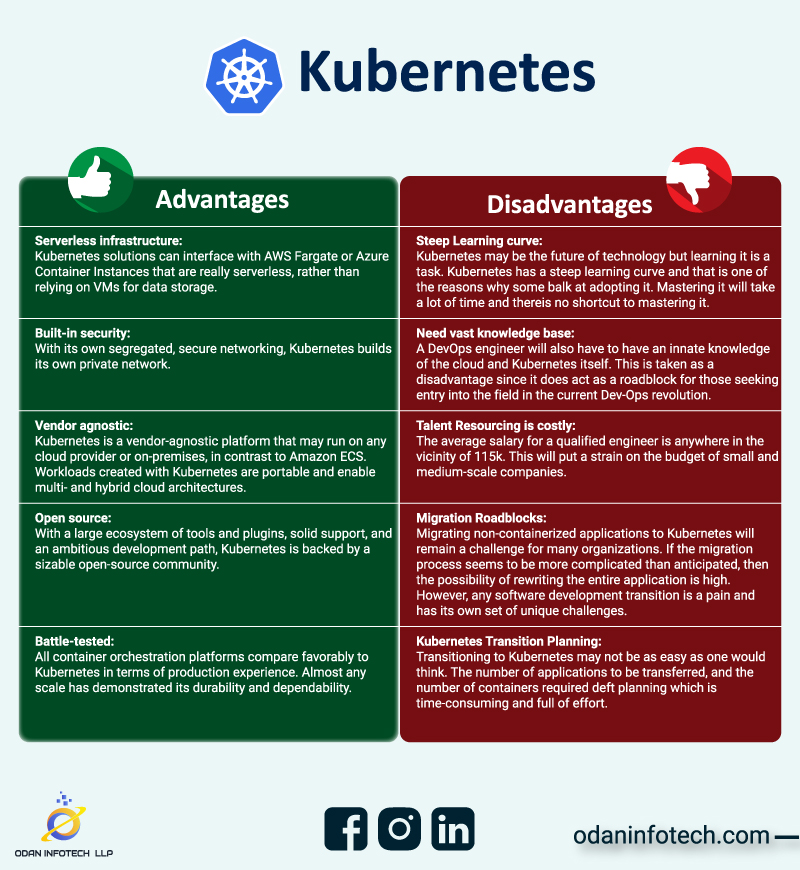
AWS ECS Container: Advantages And Disadvantages
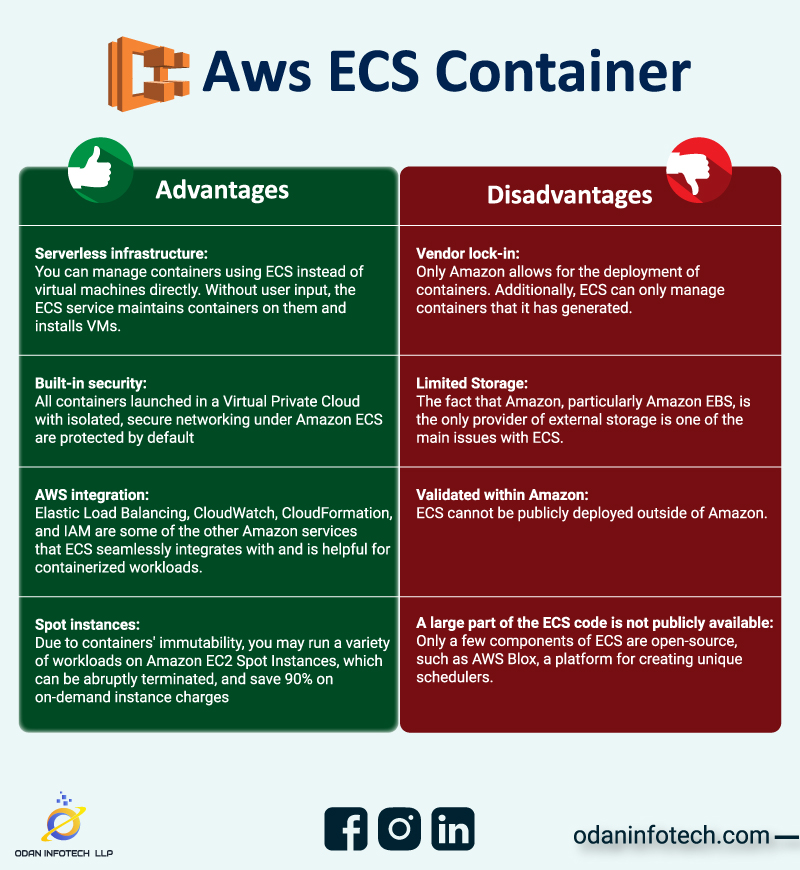
List Of Companies Uses Kubernetes
Google
According to Kubernetes Statistics, Google has contributed to the project more than any other organization with over 900,000. Additionally, Google provides the Google Container Engine (GKE), which enables businesses to use the Google Cloud Platform to run Kubernetes.
Spotify
Spotify started migrating to Kubernetes in 2018 to take advantage of the growing community and robust feature set, and the team said the autoscaling of Kubernetes greatly benefits the largest service running on the technology which takes over 10 million requests per second.
Capital One
Capital One, said that Kubernetes helps them launch apps in as short as two weeks—something that would have once taken an entire quarter or longer. Furthermore, Capital One uses Kubecost to monitor and allocate costs across clusters.The New York Times
The main reason the New York Times uses the Google Cloud Platform (GCP) for GKE is to speed up deployment. A single system provided by Kubernetes also enables The New York Times to replace several internal tools and deployment strategies, further enhancing productivity. Almost all of the user-facing applications on The New York Times website operate on GCP at this time.
Pinterest
Kubernetes supports Pinterest in deploying projects faster and building failover policies, they said Kubernetes allows the team to reclaim over 80% capacity during non-peak hours.
Adidas
The load time of the Adidas website was reduced by 50% thanks to a combination of Kubernetes running on AWS and Prometheus, and the team was able to deploy updates 10,000% more quickly, going from once every 4-6 weeks to 3-4 times a day.
Tinder
For scaling and stability, Tinder move to Kubernetes in 2018 and now operates completely on the Kubernetes cluster with 200 services, 1,000 nodes, 15,000 pods, and 48,000 containers that can handle all of the individual microservices that Tinder uses. Tinder’s containers can now serve traffic in a matter of seconds instead of minutes.
Airbnb
uses Kubernetes to manage the thousands of nodes and several clusters that make up its scalable and unified infrastructure. Additionally, Airbnb developed a tool called Kube-gen that enables developers to uniformly design production, staging, and canary environments as well as to streamline the Kubernetes interface.
List Of Companies Uses AWS ECS Container
Samsung
The Samsung developer portal (Samsung Developers) is Samsung’s online portal built to serve technical documents, the Developer blog, and API guides to developers, IT managers, and students interested in building applications with Samsung products. They developed it on Amazon Elastic Container Service (ECS) but have now migrated it to AWS Fargate.
AOL
It uses a broad range of AWS services, such as Lambda for creating serverless architectures, and uses varieties of Amazon Elastic Compute Cloud (Amazon EC2) instances to carefully manage its costs. It also leverages AWS for hybrid scenarios for particular workloads.
BMW
BMW Group will open-source key components surrounding its CDH. The CDH is the company's foundation for developing data-driven IT solutions and enables the company to scale on a serverless architecture. It will also become a first-day member of Gaia-X, an initiative for establishing sovereign data spaces.Comcast Corporation
Comcast uses AWS in a hybrid environment to innovate and deploy features for its flagship video product, XFINITY X1, several times a week instead of once every 12-18 months under its old architecture and it delivers scalability and security needed for rapidly innovating in a hybrid environment.
Siemens
Siemens uses a range of AWS services, including Amazon Elastic Compute Cloud, Elastic Load Balancing, Amazon Relational Database Service, AWS Auto Scaling, Amazon ElastiCache, and AWS CloudTrail for data analysis. Siemens uses AWS Support in order to optimize its migration and lower costs.
Johnson & Johnson
When Johnson & Johnson's IT division made the decision to transition to the cloud and reevaluate its whole IT strategy, it went to Amazon Web Services (AWS). The business presently runs 120 apps on the AWS Cloud, and its big data architecture enables it to conduct labor-intensive and intricate data modeling. Next, the business intends to introduce 25,000 Amazon Workspaces cloud-based workstations for its consultants and staff to use anywhere in the world, while tripling the number of apps it hosts on AWS.
Walt Disney Company
Disney+ is expanding its use of Amazon Web Services (AWS) to include more than 50 technologies. These include machine learning, database, storage, content delivery, serverless, and analytics for the company's video streaming platform. Disney+ uses Amazon Kinesis and Amazon DynamoDB to ingest billions of customer actions each day.
Unilever
Has more than 1,700 web properties running on Amazon Web Services (AWS). After a successful pilot launch, Unilever migrated more than 500 web properties from its data centers to AWS in less than five months. The way CSS automated launching instances reduced the time to launch a project by about 75%.
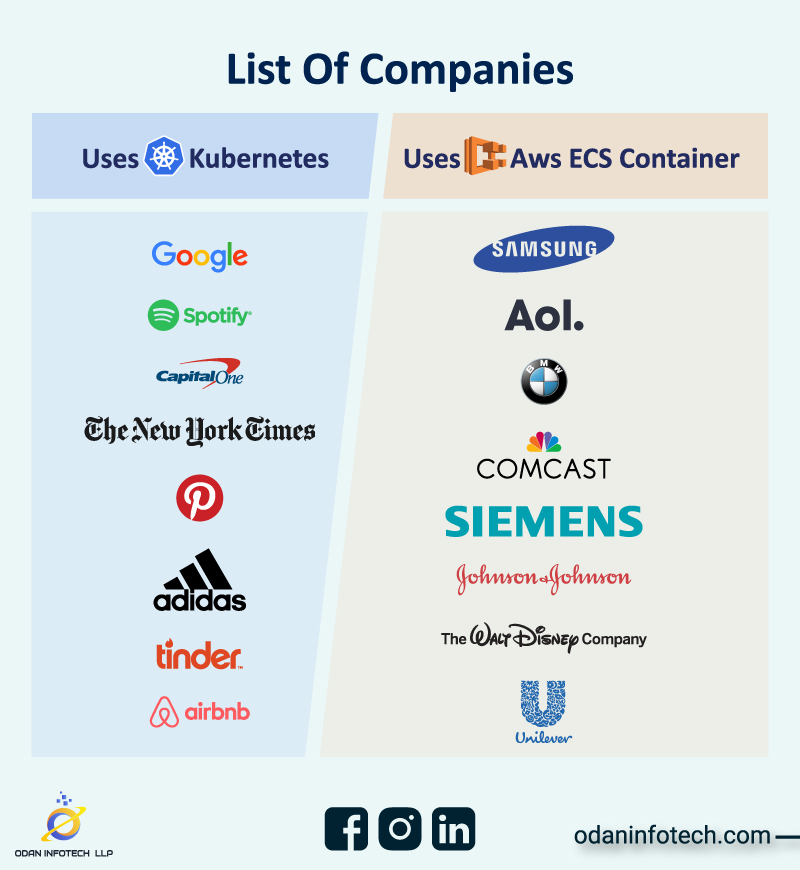
Use Case Of Kubernetes vs AWS ECS
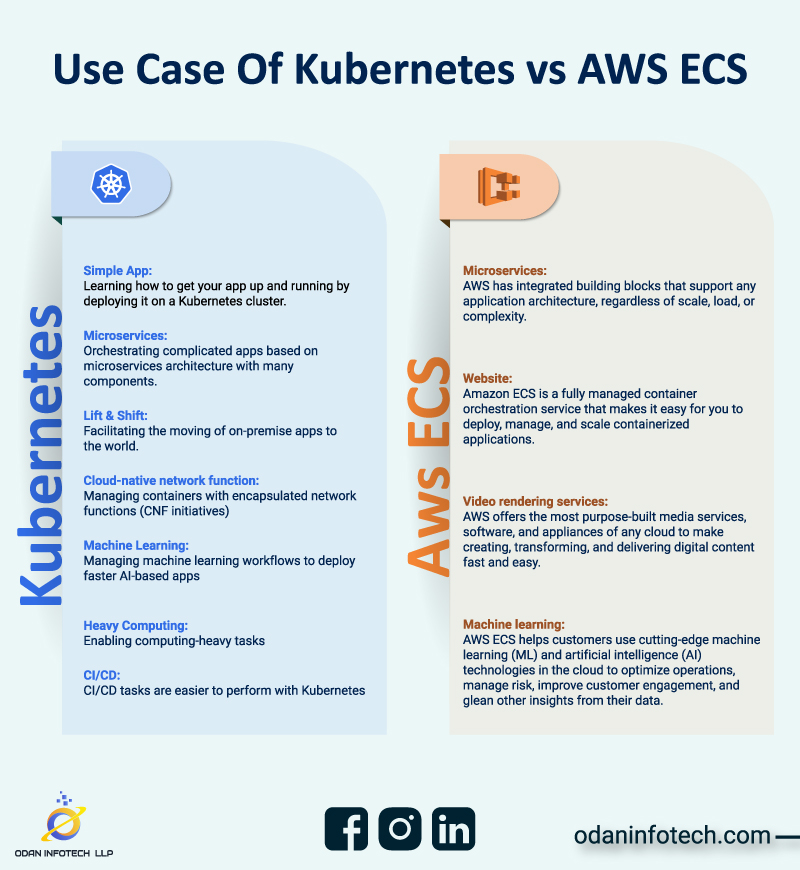
Conclusion
It's time to choose which container orchestration platform is ideal for you now that we've looked more closely at each one and compared Kubernetes and Amazon ECS.
Kubernetes is clearly the best option for multi-cloud, but if you want to save back on IT staff, hosting expenses, and management, Amazon ECS is the way to go.
About Us
To Deliver superior innovative solutions and customer experiences software service and technology revolutions we expand constructive and customer-centric applications to give your users a constant cordial experience without restricting ourselves, we match your vitality and services worldwide. Reach out for more: [email protected]

